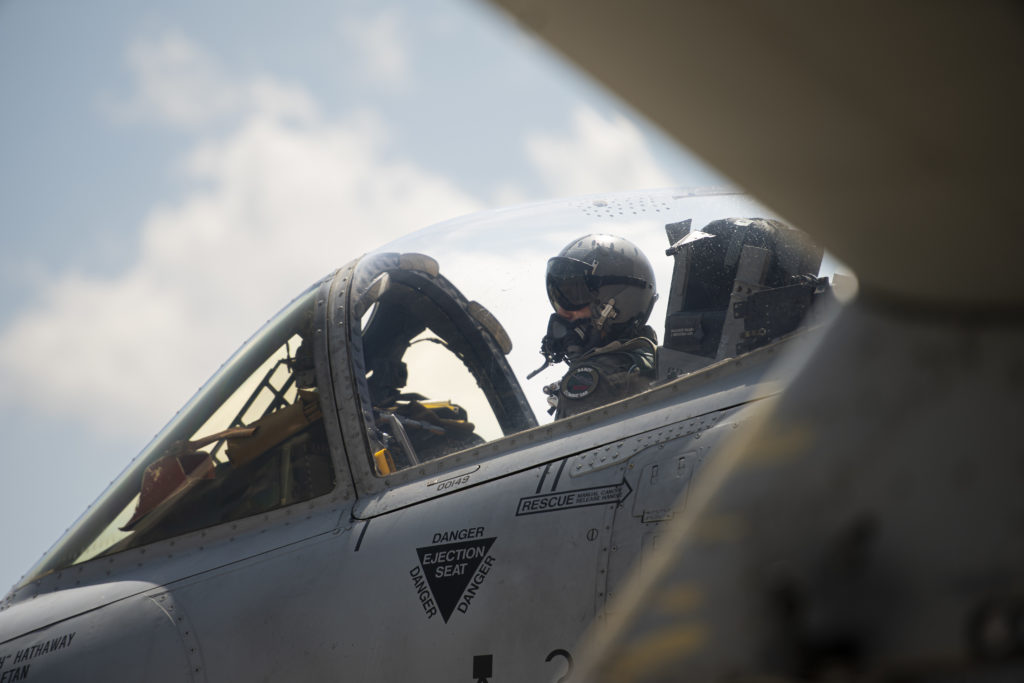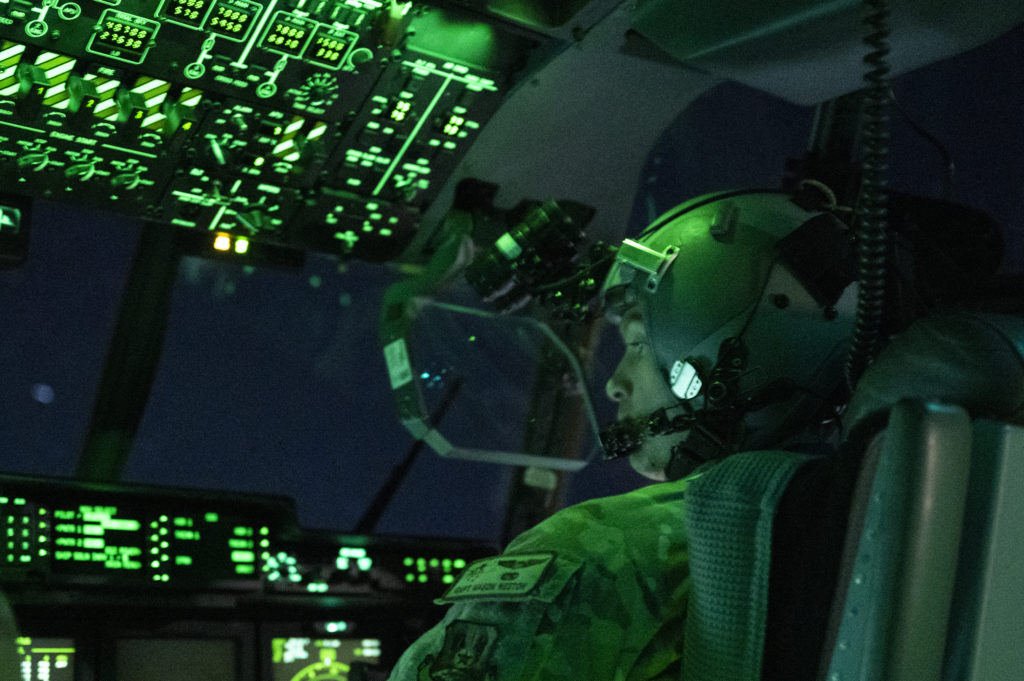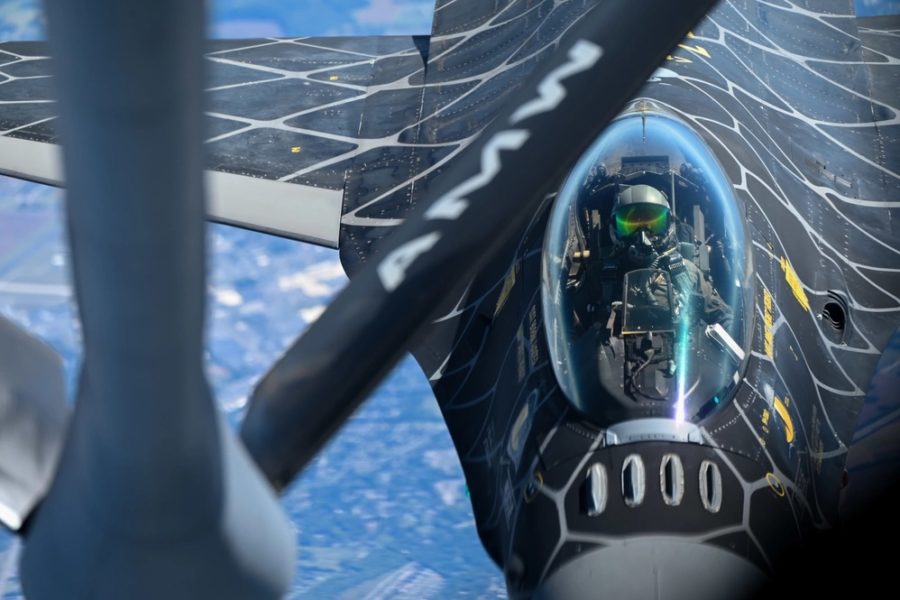An Air Force doctor wants to help fix a longstanding problem in aviation culture: the fact that pilots often misrepresent or withhold health information from flight surgeons out of fear that they might lose their flying status.
While the concept of “lie to fly” is well-known across the aviation community, Capt. Billy Hoffman, a neurologist, discovered there is little scientific research on the issue.
“I was just so surprised to find that, while this is a relatively common, known thing that pilots joke about, there really was not much in the medical literature,” Hoffman, a trained pilot himself, told Air & Space Forces Magazine. Hoffman emphasized his views do not necessarily reflect those of the Department of Defense or any other government agency.
“I see this in the clinic: some pilots delay care or they don’t disclose all their health information for fear of what it means professionally for them,” he said. “We need to measure the problem that we hope to fix.”
Hoffman was the lead author for a study on health care avoidance among military pilots which appeared in the Military Medicine journal this March. The study found that out of 264 military pilots, 190 (72 percent) reported a history of health care avoidance, 111 (42.5 percent) misrepresented or withheld information on a written health care questionnaire, 89 (33.7 percent) flew despite experiencing a new physical or psychological symptom that they felt probably should be evaluated by a physician, and 30 (11.4 percent) reported a history of undisclosed prescription medical use.
Continuing to fly without reporting troublesome medical symptoms “is overtly against regulations for U.S. military pilots because of aviation safety concerns and increased health risks to the pilot,” the study authors noted. “These data speak to the risk (both aviation safety and individual health-related) certain military pilots may willingly tolerate to avoid health care because of fear of losing their flying status.”

The military pilot study was a sub-analysis of a larger study that involved more than 3,500 pilots across the U.S., possibly the largest ever conducted on pilot health care avoidance. The military study marked one of the first attempts to scientifically analyze the widely-held belief that military pilots avoid health care, particularly mental health care, out of fear that certain medical conditions will take them off flight status.
Even so, some members of the Air Force community were unfazed by the results.
“I didn’t click the article … because it’s such an obviously obvious fact,” one commenter wrote on the unofficial Air Force subreddit in response to an Air & Space Forces Magazine article about the study.
“’If you ain’t lying, you ain’t flying,’” said another. “Heard that too many times and I’m only 8 years into it.”
Hoffman is familiar with those reactions and the argument that even with a health care-avoidant culture, aviation in general and military aviation in particular have relatively low rates of mishaps.
“But we all have a vested interest in aviation safety, and this is a barrier to health care where having a fresh set of eyes may help us meet the optimal safety standard in the most efficient way possible,” Hoffman argued.
Indeed, health care avoidance can still have a significant impact—a study showed five percent of fatal aviation accidents in U.S. general aviation in 2015 were estimated to be related to the pilot’s unreported health issues, though study authors said the figure likely underestimated the number of cases.
“We all stand to gain by working on this problem,” Hoffman said. “Everybody stands to win.”
‘Trust and Rapport’
Health care avoidance in pilot culture goes back to the earliest days of aviation. Military pilots in World War I faced unique medical challenges such as hypoxia, centrifugal force, and other environmental exposures. Military and civilian aviation authorities decided there needed to be medical standards to gauge whether pilots were fit to fly, as well as medical professionals who knew how to make that judgment.
As far back as the 1920s, aviation medicine textbooks encouraged flight surgeons to get to know their aviators so they could better identify poor health conditions.
“They had a sense, even in these early textbooks, that pilots would be worried about seeking care for loss of flying status,” Hoffman explained. Flight surgeons represented “a tool to mitigate health care avoidance or, maybe not telling all the information for fear of loss of flying status, and that culturally has really permeated.”
Even today, many flight surgeons wear flight suits and maintain a certain number of flight hours a year partly to help “build this trust and rapport in hopes of allowing pilots to disclose information and get the help they need,” Hoffman said.
A wide range of conditions could possibly require an aviator to undergo an evaluation, including mental health, cardiovascular conditions, or neurological issues.
Still, there is some wiggle room depending on individual circumstances. Different aircraft have different medical requirements, and military or civilian pilots can receive waivers for certain conditions. But it can still be tough to get an aviator to ask for help, partly because they are trained to be self-reliant.
“The type of person that is willing to sit in the front of a wide body airliner with 350 people on board over the North Atlantic at 40,000 feet and be ready at any moment to handle an engine failure, a radio failure, bad weather, and a medical emergency all at the same time … that’s a different skill set than the person who is going to raise their hand and say ‘I need to take a knee because I need help,’” Hoffman said. “There are many brave people who do that, but the type of things that we look for in pilots sometimes can run counter to help-seeking.”

‘We need healthy pilots’
Hoffman’s family and friends include both military and civilian pilots, and one of his friends found himself in a dire situation where seeking health care may have jeopardized his flying career. That experience helped motivate Hoffman to keep studying the topic after graduating medical school. The problem is there have not been many rigorous analyses of why aviators avoid health care.
“A lot of people have different opinions, but to my knowledge nobody has ever gone after that question systematically,” he said. “We need healthy pilots, and they will always need to meet standards to fly. So what are the things that we can modify?”
Education, culture, stigma, and understanding of health care processes may lead to better outcomes, but first scientists and policy makers need to better understand the problem, and that will take research. Hoffman is the chairman of a working group at the Aerospace Medical Association working to establish a “wish list” of data needed to better understand the problem of health care avoidance in aviation.
“The hope is that it will be a tool to guide research both in this country and maybe further, because we need all hands on deck,” he said. “It is important that we have a central set of priorities that we are using.”
Some of those priorities include studying how to foster wellness and prevention in an organization; how to effectively screen pilots for mental health conditions; how to monitor pilots in between screenings or exams, especially with regard to mental health; and how to safely return pilots to flying after getting the help they need.
Hoffman has found plenty of interest for better understanding the issue. He has led 16 briefings in three countries with military organizations, U.S. and international airliners, aviation business leaders, and academic aviation institutions.
“We as researchers are just science people, we are not policy people,” he explained. “In my opinion, the hardest part is translating research into a usable product, so the foundation of that is building partnerships with stakeholders and the people who can hopefully use the data.”
A Global Phenomenon
Hoffman and his fellow researchers have several efforts underway to better understand health care avoidance in aviation. One of those is a multinational comparison study of 5,000 pilots across North America. They are starting another in Australia, and there are still others on the way.
“The data is suggesting that health care avoidance is not unique to the U.S.,” he said. “This might be a global phenomenon.”
Indeed, one study found 56 percent of U.S. pilots reported a history of health care avoidance for fear of losing their flight status, alongside 55 percent of Canadian pilots. Another study will interview between 100 and 200 pilots to ask about the factors that encourage or discourage the use of health care.
For example, many U.S. military pilots worry that even if they do seek health care and are temporarily taken off flight status, they may not be able to regain flight status due to a risk-averse waiver bureaucracy they feel does not consider individual circumstances. Hoffman said he has often encountered that fear of bureaucracy, and he hopes the studies he and other researchers are conducting will shed more light on it and other factors affecting health care avoidance.
“There are going to be hundreds of pages of transcripts talking with pilots about this problem,” he said. “We think that pilots probably have the solution: They have a vested interest in safety, so that is the whole premise of this.”
There are already some promising initiatives for pilot health care. Hoffman pointed out that peer support programs have emerged in U.S. and international airlines over the past several years. In the U.S., the Air Line Pilots Association International’s Pilot Peer Support program allows aviators to contact pilot volunteers to confidentially discuss financial problems, professional issues, relationship strains, and other sources of stress.
“The idea is that it is anonymous, so you are not going to get pulled from flying,” Hoffman explained. “That pilot on the other side who is trained and vetted for this type of role can talk them through it, direct them to resources. That is a really successful program, and this is just my opinion, but there may be a space for a formal peer support program across the Air Force.”
With all the enthusiasm and support for his research, Hoffman feels hopeful aviation can become more of a health care-seeking community in the future.
“When I talk to pilots, I try to convey that there are many reasons to feel optimistic,” he said. “In the end, it all comes down to safety. If health care avoidance is occurring, and we feel the data suggests that it does at a very high level, then working on this could only further increase safety. And so we all stand to gain.”
Hoffman advised aviators who may be wondering whether to report a troubling health condition to do so sooner rather than later. Especially given how self-reliant most pilots are trained to be, Hoffman said, a pilot’s condition is likely to be serious if he or she is at a point where they are considering asking for treatment.
“We’re human, it’s OK to need help,” Hoffman said. “In my opinion, the short-term fix is pilots should get care early and partner with their flight medicine clinicians to try to get that care and then get back to flying if that’s what they choose to do.”
Hoffman encouraged readers who are interested in supporting the research effort to reach him at his LinkedIn or Instagram page.
